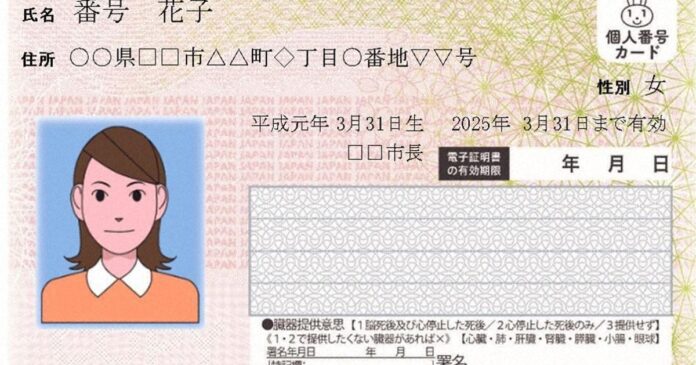
The Japanese government has drawn up an interim report over a stream of problems plaguing the “My Number” national identification system, including link errors involving the wrong person’s data. The mishaps are attributed to inadequate identification processes at a total of 5,000 local governments and other bodies when they linked 29 items of information such as social security and taxation to My Number IDs.
In particular, problems have surfaced over data fed into My Number health insurance cards. Flaws have been found at around 40% of health insurance associations and other bodies handling the cards. The number of cases where the wrong person’s data was linked to My Number IDs has been swelling, making it hardly possible to recover confidence in the system anytime soon.
Given the circumstances, it is unreasonable for the government to scramble to effectively mandate the public to obtain My Number health insurance cards by next autumn, by integrating the current health insurance cards into the controversial My Number cards.
Digital Minister Taro Kono has blamed local bodies and others handling My Number IDs for the array of blunders, saying, “There was a lack of awareness among organizations responsible for linking the data.” This is nothing but shifting the blame to other parties.
Some local bodies had a poor sense of awareness in protecting personal information, yet the series of link errors could have been prevented if the national government had prepared systematic manuals and systems to automate work flows.
While the health ministry had issued a notice on points to take heed of when registering data for My Number IDs, the notification was not thoroughly observed. The government is gravely responsible for lagging behind in taking a response, while failing to get a full picture of what was going on on-site.
Organizations that have had issues with their data linkage methods are required to inspect all registered information by the end of November. As this will be an enormous task, some local governments are worried if they can make it before the deadline. No improvements will likely be made unless officials carefully check the data without setting a deadline.
The government’s plan to abolish the conventional health insurance cards next fall should be premised on the development of mechanisms to properly link data and the introduction of systems to prevent errors. The government must not move ahead with the plan by prioritizing its schedule.
Needless to say, digitalization of Japan’s administrative work is a pressing issue. If My Number health insurance cards are widely used, it will enable doctors and pharmacists to share information on medical examinations and medication, and provide appropriate health care services.
Yet this will have only a limited effect unless electronic medical charts, online medical examinations and data-based preventive care are promoted in a comprehensive manner. To that end, it is imperative for both medical institutions and users to fully understand the necessity and risks entailed in these systems.
There are deep-rooted worries among the public over the planned scrapping of health insurance cards. If the administration rushes ahead with the plan, it will only spur public distrust in the government. This could in turn put a brake on digitization efforts.
Prime Minister Fumio Kishida said he will finalize a decision on the timing of scrapping the current health insurance cards after assessing the progress of the government’s comprehensive inspection of My Number systems. It is about time for the government to consider reviewing its plans by taking the actual circumstances into account, such as whether administrative bodies, which practically handle My Number-related tasks, as well as medical institutions and welfare facilities can really be ready for the elimination of the present health insurance cards.




































